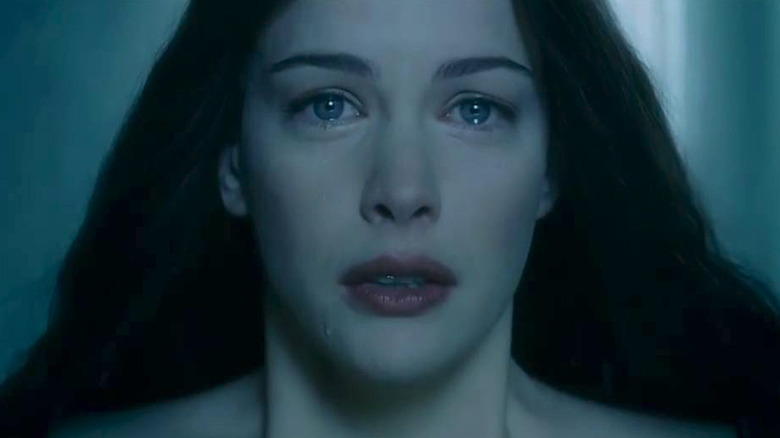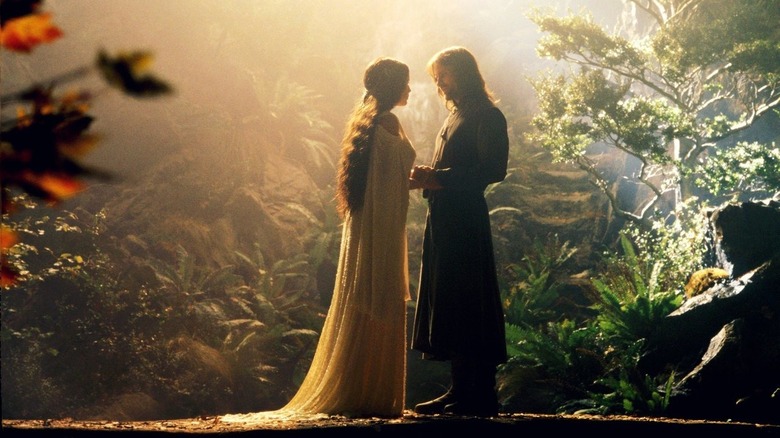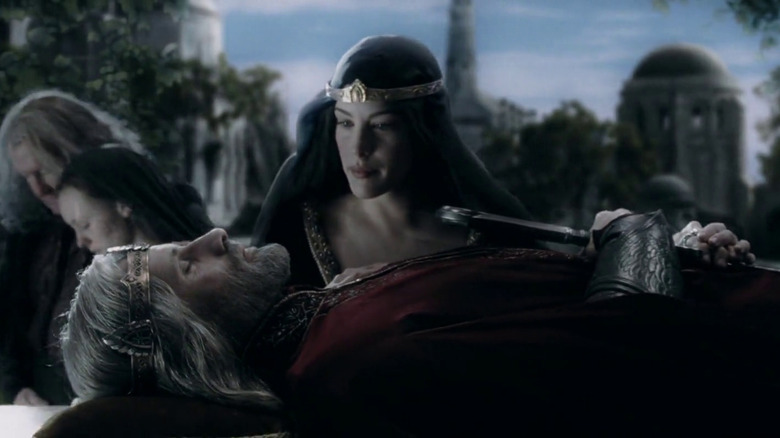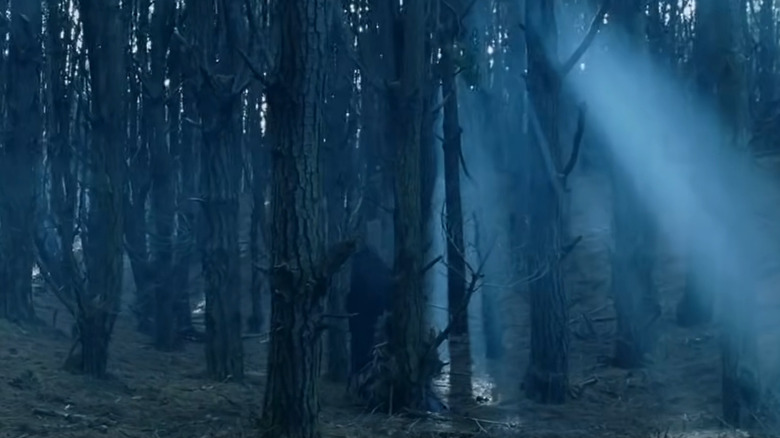What Happened To Arwen Was A Lord Of The Rings Tragedy
When we meet Arwen Undómiel (elvish for Evenstar) in "The Lord of the Rings," she is the beautiful and long-lived daughter of Elrond Peredhil (Elvish for half-elven). Arwen, too, is a Peredhil, which means she has both Elvish and Human blood (and a dash of angelic blood tossed in there, just for good measure). This gives her a life trajectory that is reserved for very few individuals in Middle-earth, one with a choice of perpetual life in Middle-earth or the ability to pass away through death to whatever comes afterward.
As any fan of "The Lord of the Rings" (books or movies) will tell you, Arwen uses her choice to marry Aragorn (yes, they're distantly related but it doesn't matter) and become the mortal Queen of Gondor. What fans of the movies and even book readers who didn't wade through the heady appendices of "The Return of the King" may not realize, though, is that Arwen actually comes to a sad and tragic ending after "The Lord of the Rings" wraps up. How so? In a nutshell, she dies of grief.
But that is just the tip of the iceberg for an important and long-lived life. Let's back up a bit and look at how Arwen comes to her bitter ending.
Arwen's life (in brief)
Arwen may ultimately choose a mortal life, but initially, she spends thousands of years living alongside her likewise immortal half-elven father. Like any being of this nature, that means she sees a lot of stuff, all of which happens during the Third Age — meaning we won't get to see her in Prime Video's "The Rings of Power" series, which takes place during the Second Age. (Although the writing team for that show has messed with the Tolkien timeline more than once, so anything is possible.)
"The Return of the King" appendices (which contain most of the extracurricular info on Arwen's life) say that she is born 241 years into the Third Age. She lives for over 2,700 years in relative anonymity amongst the Elves, until one day, she bumps into a 20-year-old Aragorn who becomes enamored by her ancient elven beauty. Long story short, Aragorn grows up, relatively speaking, and Arwen eventually falls in love with the rugged man that he's become. Even so, they wait to get hitched until after the War of the Ring, at which point Arwen marries Aragorn and they become the new King and Queen of the reunited kingdoms of Gondor and Arnor (basically the whole left side of the Middle-earth map).
At this point, Arwen is almost 2,800 years old, but she gives up her immortality to be with Aragorn. Fortunately, Aragorn's ancestry means he lives an extraordinarily long life too (at least for a mere Man), and he goes on kicking for 120 more years. It isn't until he is 210 years old that Aragorn lays down his life and shuffles off this mortal coil — an event that directly leads to Arwen's death.
Aragorn's death (which leads to Arwen's death)
When we say "Aragorn lays down his life," we mean it quite literally. The man dies of his own accord. He chooses, in ripe old age, to surrender his life willingly and die before he becomes incapacitated by old age. This is something that his long-lived ancestors were allowed to do as well.
When he tells Arwen that the time has come, we get the heartbreaking line (in "The Return of the King" appendices), "Arwen knew well what he intended, and long had foreseen it; nonetheless she was overborne by her grief. 'Would you then, lord, before your time leave your people that live by your word?'" Aragorn points out that it isn't "before" his time. He is getting too old and their son, Eldarion, is ready to be the king.
When Aragorn finally does pass into his final sleep, he tells Arwen, "I speak no comfort to you, for there is no comfort for such pain within the circles of the world." He says she could repent of her mortal choice and seek passage to the Undying Lands of the Elves at the Grey Havens, but she says it's too late. Her choice is permanent, and she must abide the "Doom of Men" — i.e. death. Then she utters the painfully insightful line, "Not till now have I understood the tale of your people and their fall. As wicked fools I scorned them, but I pity them at last. For if this is indeed, as the Eldar say, the gift of the One to Men, it is bitter to receive."
Arwen's death (in detail)
When Aragorn passes away shortly after this, Arwen is broken. If all of this sounds familiar, it's because anyone who has watched the lengthy extended edition of "The Two Towers" knows there is a scene where Elrond (Hugo Weaving) intimidates (for lack of a better word) his daughter (Liv Tyler) into leaving Middle-earth by telling a story of her grief when Aragorn (Viggo Mortensen) will die. We see her crying and wandering through some sad-looking woods. In that case, she calls her father's bluff, but that scene is clearly drawn from her actual canon ending — and it gets worse.
After Aragorn is gone, Arwen leaves the house of the dead, and the text says, "the light of her eyes was quenched, and it seemed to her people that she had become cold and grey as nightfall in winter that comes without a star." She says goodbye to her beloved son and daughters and then goes to Lothlórien. At this point, though, there is no healing there. The Elves, Celeborn, and Galadriel (with her nature-preserving Ring of Power) are long gone, and the land is empty and silent.
Part of the last line J.R.R. Tolkien gives us reads, "There at last when the mallorn-leaves were falling, but spring had not yet come, she laid herself to rest upon Cerin Amroth; and there is her green grave, until the world is changed, and all the days of her life are utterly forgotten by men that come after, and elanor and niphredil bloom no more east of the Sea." Tears your heart out, right? It is a tragic ending you never would have seen coming in the happy days after the One Ring is destroyed.



